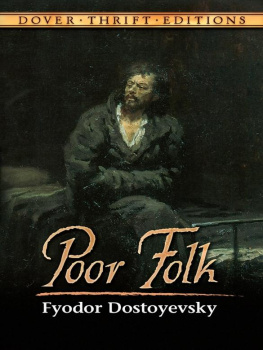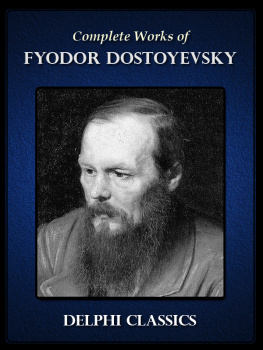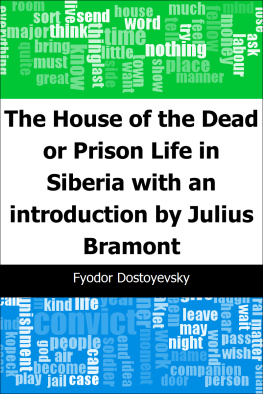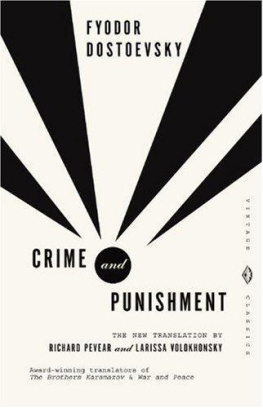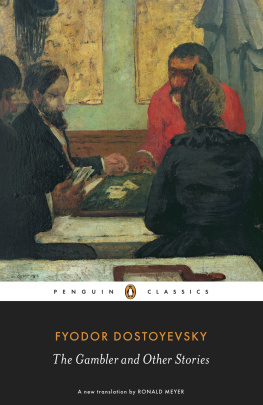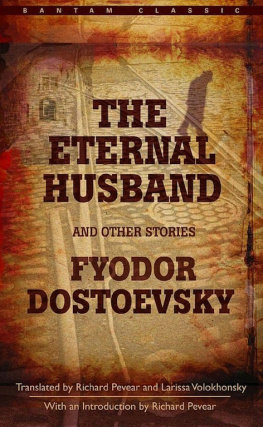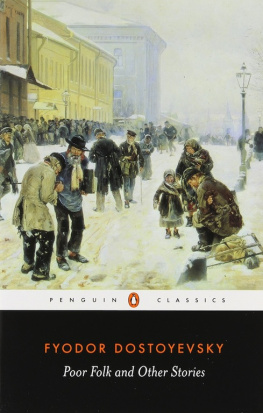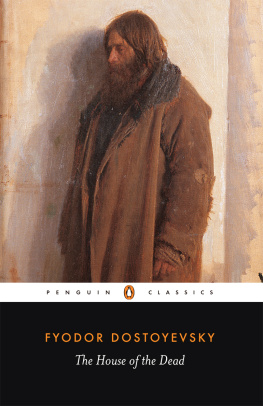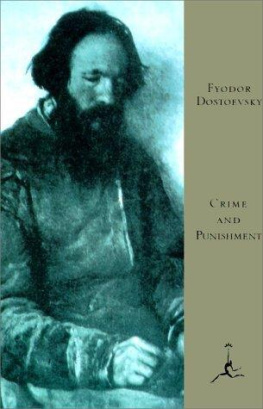Fyodor Dostoyevsky - Poor Folk
Here you can read online Fyodor Dostoyevsky - Poor Folk full text of the book (entire story) in english for free. Download pdf and epub, get meaning, cover and reviews about this ebook. year: 2012, publisher: Dover Publications, genre: Art. Description of the work, (preface) as well as reviews are available. Best literature library LitArk.com created for fans of good reading and offers a wide selection of genres:
Romance novel
Science fiction
Adventure
Detective
Science
History
Home and family
Prose
Art
Politics
Computer
Non-fiction
Religion
Business
Children
Humor
Choose a favorite category and find really read worthwhile books. Enjoy immersion in the world of imagination, feel the emotions of the characters or learn something new for yourself, make an fascinating discovery.
- Book:Poor Folk
- Author:
- Publisher:Dover Publications
- Genre:
- Year:2012
- Rating:5 / 5
- Favourites:Add to favourites
- Your mark:
- 100
- 1
- 2
- 3
- 4
- 5
Poor Folk: summary, description and annotation
We offer to read an annotation, description, summary or preface (depends on what the author of the book "Poor Folk" wrote himself). If you haven't found the necessary information about the book — write in the comments, we will try to find it.
Poor Folk — read online for free the complete book (whole text) full work
Below is the text of the book, divided by pages. System saving the place of the last page read, allows you to conveniently read the book "Poor Folk" online for free, without having to search again every time where you left off. Put a bookmark, and you can go to the page where you finished reading at any time.
Font size:
Interval:
Bookmark:

DOVER THRIFT EDITIONS
GENERAL EDITOR: MARY CAROLYN WALDREP
EDITOR OF THIS VOLUME: SUSAN L. RATTINER
Copyright
Copyright 2007 by Dover Publications, Inc.
All rights reserved.
Bibliographical Note
This Dover edition, first published in 2007, is an unabridged republication of the Constance Garnett translation of the work, as originally published in the collection The Gambler and Other Stories by W. Heinemann, London, in 1914. A new introductory Note has been specially prepared for the present edition.
Library of Congress Cataloging-in-Publication Data
Dostoyevsky, Fyodor, 18211881.
[Bednye liudi. English]
Poor folk / Fyodor Dostoyevsky ; translated by Constance Garnett. p. cm. (Dover thrift editions)
Originally published as part of the collection The gambler and other stories:
London: Heinemann, 1914. With new introd.
9780486110882
1. Garnett, Constance Black, 18621946. 2. Dostoyevsky, Fyodor, 18211881. Gambler and other stories. I. Title. II. Series.
PG3326.B4 2007
2006047014
Manufactured in the United States of America
Dover Publications, Inc., 31 East 2nd Street, Mineola, N.Y. 11501
Table of Contents
Note
FYODOR DOSTOYEVSKY (18211881) was born and raised in Moscow, where he was educated before attending the School of Military Engineers in St. Petersburg. After three years in the army, Dostoyevsky resigned to devote himself to writing. In 1843, he published his first work, a translation of Balzacs novel Eugnie Grandet. His first novel, Poor Folk, written in 1845, brought him exuberant critical praise, most notably from Vissarion Belinsky, a leading critic of the day, and fame followed virtually overnight. Proclaimed the next Gogol, Dostoyevsky was hailed as a powerful new talent in Russian literature. Having gained instant celebrity at the age of twenty-four, Dostoyevsky proceeded to publish ten novels and short stories within the next five years. However, his subsequent works did not enjoy the same popular success, the fault of largely unrealistic expectations from both critics and the public.
In 1849, Dostoyevsky was arrested and imprisoned in the Petropavlovsk Fortress in St. Petersburg for his participation in a French utopian socialist group led by Petrashevsky, a rich political dilettante. In addition to reviewing political books banned by the government, the Petrashevsky circle also debated pertinent social reform issues of the day. Along with several other liberal-minded intellectuals, Dostoyevsky was tried for treasonous activities and sentenced to death, a decree that was later changed to four years of hard labor in a Siberian prison followed by four more years as a soldier in the ranks. However, this commuted sentence was not revealed until a stunningly malicious joke had been played out on the group; Dostoyevsky and his cohorts were actually standing before the firing squad and were told the truth at the last moment: that this was just a mock execution. He was released from prison in 1854, and he did not return to St. Petersburg until 1859. His time in the penal colony did much to shape the authors political and religious beliefs, bringing him away from his youthful liberal leanings and toward the orthodoxy of the Russian church; it did much as well to exacerbate the epilepsy that would plague him for the rest of his life.
Written in epistolary form, in which letters of correspondence take the place of narration and dialogue, Poor Folk tells the story of a bleak and hopeless love between a clerk and a poor young seamstress. Depicting the tragedies of everyday life, this early fictional work contains a remarkably vivid characterization for a novel composed solely of letters between characters. This natural ability to connect his readers emotionally to his characters has become one of the hallmarks of Dostoyevskys skillful writing style. Although the powerful appeal of Poor Folk is often overshadowed by the sumptuous success of his later masterpieces such as Crime and Punishment (1866), The Idiot (1868), and The Brothers Karamazov (1880), the authors forte in dramatizing the many social and moral problems confronting mankind is conveyed well here.
POOR FOLK
A NOVEL
Ah, these story tellers! If only they would write anything useful, pleasant, soothing, but they will unearth all sorts of hidden things!... I would prohibit their writing! Why, it is beyond everything; you read... and you cant help thinkingand then all sorts of foolishness comes into your head; I would really prohibit their writing; I would simply prohibit it altogether.PRINCE V. F. ODOEVSKY.April 8.
MY PRECIOUS VARVARA ALEXYEVNA,
I was happy yesterday, immensely happy, impossibly happy! For once in your life, you obstinate person, you obeyed me. At eight oclock in the evening I woke up (you know, little mother, that I love a little nap of an hour or two when my work is over). I got out a candle, I got paper ready, was mending a pen when suddenly I chanced to raise my eyesupon my word it set my heart dancing! So you understood what I wanted, what was my hearts desire! I saw a tiny corner of your window-curtain twitched back and caught against the pot of balsams, just exactly as I hinted that day. Then I fancied I caught a glimpse of your little face at the window, that you were looking at me from your little room, that you were thinking of me. And how vexed I was, my darling, that I could not make out your charming little face distinctly! There was a time when we, too, could see clearly, dearie. It is poor fun being old, my own! Nowadays everything seems sort of spotty before my eyes; if one works a little in the evening, writes something, ones eyes are so red and tearful in the morning that one is really ashamed before strangers. In my imagination, though, your smile was beaming, my little angel, your kind friendly little smile; and I had just the same sensation in my heart as when I kissed you, Varinka, do you remember, little angel? Do you know, my darling, I even fancied that you shook your little finger at me? Did you, you naughty girl? You must be sure to describe all that fully in your letter.
Come, what do you think of our little plan about your curtain, Varinka? It is delightful, isnt it? Whether I am sitting at work, or lying down for a nap, or waking up, I know that you are thinking about me over there, you are remembering me and that you are well and cheerful. You drop the curtainit means Good-bye, Makar Alexyevitch, its bedtime! You draw it upGood morning, Makar Alexyevitch, how have you slept or are you quite well, Makar Alexyevitch? As for me, thank God, I am well and all right! You see, my darling, what a clever idea; there is no need of letters! Its cunning, isnt it? And you know it was my idea. What do you say to me now, Varvara Alexyevna?
I beg to inform you, Varvara Alexyevna, my dear, that I slept last night excellently, contrary to my expectations, at which I am very much pleased; though in new lodgings, after moving, it is always difficult to sleep; there is always some little thing amiss.
I got up this morning as gay as a lark! What a fine morning it was, my darling! Our window was opened; the sun shone so brightly; the birds were chirping; the air was full of the scents of spring and all nature seemed coming back to lifeand everything else was to correspond; everything was right, to fit the spring. I even had rather pleasant dreams to-day, and my dreams were all of you, Varinka. I compared you with a bird of the air created for the delight of men and the adornment of nature. Then I thought, Varinka, that we men, living in care and anxiety, must envy the careless and innocent happiness of the birds of the airand more of the same sort, like that; that is, I went on making such far-fetched comparison. I have a book, Varinka, and there is the same thought in it, all very exactly described. I write this, my darling, because one has all sorts of dreams, you know. And now its spring-time, so ones thoughts are always so pleasant; witty, amusing, and tender dreams visit one; everything is in a rosy light. That is why I have written all this; though, indeed, I took it all out of the book. The author there expresses the same desire in verse and writes:
Next pageFont size:
Interval:
Bookmark:
Similar books «Poor Folk»
Look at similar books to Poor Folk. We have selected literature similar in name and meaning in the hope of providing readers with more options to find new, interesting, not yet read works.
Discussion, reviews of the book Poor Folk and just readers' own opinions. Leave your comments, write what you think about the work, its meaning or the main characters. Specify what exactly you liked and what you didn't like, and why you think so.

